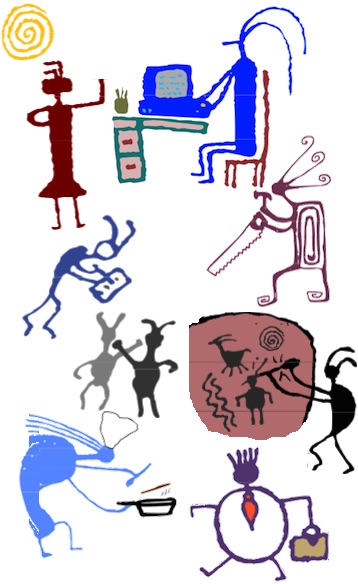Last week, I signed up to help at a community event, held yesterday.
Just. To. Help. To assist.
Yesterday, when I arrived at the event site – a public school – I found out I was in charge of the entire event. More than 30 kids would be there in an hour, expecting me to lead them through 90 minutes of activities that were completely foreign to me.
I don’t like kids.1 And I noted this at the time I signed up to help. I care about the cause, however, and as I was new to the committee – I just joined last week – I wanted to prove myself as a reliable, helpful committee member. By assisting at an event. By helping someone else in charge.
But there I was, in charge of an event I knew nothing about. About to face more than 30 kids, all under the age of 12.
I wasn’t scared. And that was good, because kids smell fear. No, instead, I was angry. Kids smell anger too, but it tends to make them listen to me. And that played to my advantage during the event – they never crossed that line into chaos that a large group of kids can so easily dissolve into.
Then there were the other adult volunteers, who were also there just to help, just to be nice. And they just kinda stood there, watching me try to pull it together. And as I was bossing those confused volunteers around in a frantic attempt to pull the event together, I wondered: Have each of these people been registered with the school and had a criminal background check? Is it my responsibility to check into that before they participate? Come to think of it, no one at the school checked to see that I was who I said I was, or asked me for my school volunteer I.D. number. How do I know any of these adults are safe to be around these kids?
I pulled the event off, on a very basic level. I drew on my experience as a manager of people, projects and events, on my two years of experience volunteering with the Girl Scouts (I’ve noticed that troop leaders at events get the kids started on an activity immediately and have them keep repeating it until volunteers are ready to move them on to the next activity), my experience having coordinated and directed more live events than is probably healthy for any one person in one lifetime, and by channeling my ever-so-bossy-but-organized Great Aunt Cornelia, who is still a legend in my family for her management abilities.
Also, it turns out none of the adult volunteers were predators nor inclined to ignore kids engaging in dangerous behavior. Lucky kids. Lucky me.
In addition, the volunteer that was supposed to be in charge did have all of the materials and equipment ready to go at the site – that helped tremendously. However, she was astounded, upon arrival just after the kids started the first activity, that the emails she sent in the preceding days weren’t understood by me and others as completely signing off on responsibility for the event (she had, indeed, said in those emails she would be late, and said myself and another volunteer would be the “leads” for the other volunteers until she got there, and some emails came with attachments… But, of course, I thought the school principal would be in charge, since she was cc’d on everything, since I have no experience at all with this kind of event, since I had made it clear I was just signing up to help, and since, to her knowledge, I have no experience doing anything like this. And I don’t like kids).
Was the event a success? In my opinion, no. It wasn’t bad, and the kids had fun and were kept busy, but the reality is: the kids didn’t really learn anything about the subject at hand. They had fun, and they walked away happy, and that’s nice – but they didn’t walk away retaining any knowledge, which was the entire purpose of the event. No minds were changed, no behaviors altered – and that was the mission of the event. A lot could have been done at the event to create that knowledge, to ensure things were remembered, to better ensure some behaviors would change, but I would have needed more than 90 minutes of prep to make that happen.
In addition, this could have been an event where not only did kids get some really essential knowledge, but also, some adults could be inspired to help at future events. And that’s why it was a stark reminder about why I – and others – train in volunteer management issues (as well as why there are so many books on event management). And why so many schools and other organizations struggle to find volunteers.
Let’s face it: a great way to drive away volunteers is to sign them up to help at an event and, when they show up, tell them they are in charge. Or have them confused about what they are supposed to do, and feeling generally unsupported. Or have them bossed around for a couple of hours by a very confused and angry me.
Volunteer management isn’t just mindless bureaucracy, with forms to fill out and procedures to be followed. It’s about ensuring that an organization or program or department mission is met. It’s about ensuring volunteers don’t show up and just do some seemingly random activities. It’s about creating experiences that lead to awareness and inspiration – not just getting some work done. It’s about ensuring safety – not just keeping fingers crossed and hoping everything works out.
And effective volunteer management is what keeps volunteers coming back again and again.
Volunteer management also isn’t just one person’s responsibility; some person at that school trusted a volunteer explicitly with organizing a safe, meaningful event for students from the school. Who was that person? What is he or she going to do about what happened yesterday? Does he or she even know what happened – and what didn’t happen? Did they just walk by and think, yeah, the kids are having fun, no problems here? Are they reading this blog right now?
I know the volunteer that was supposed to be in charge isn’t reading this blog: she also sent me an email last week proudly stating that she doesn’t read blogs and isn’t on Twitter or Facebook. Just like so many people I’ve met here in Oregon, I’m sorry to say…
Here’s a positive: I’ve never been more dedicated to the fundamentals of volunteer management and effective, program-based planning than I am right now.
I still don’t like kids though…
————
1. Okay, I don’t hate kids. I sometimes find them quite amusing. I really love watching them learn. And I’m passionate about girls knowing just how many choices and opportunities are out there. But I do not think kids are automatically cute nor innocent nor sweet, and I also don’t like parents and other adults who think of kids as precious snowflakes who have every right to scream in a restaurant – though I cut a lot of slack on airplanes.


